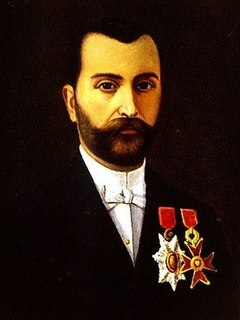
Sahar Mandour (born 1977) is a Lebanese-Egyptian novelist.

Sahar Mandour (born 1977) is a Lebanese-Egyptian novelist.
Sahar Mandour was born in Beirut to a Lebanese mother and Egyptian father. She studied psychology at Saint Joseph University in Beirut, before becoming a journalist. [1]
Mandour's novel 32 portrayed female friendships in Beirut, caught in "coexistence between bombs and parties". [2]

Amin Maalouf is a Lebanese-born French author who has lived in France since 1976. Although his native language is Arabic, he writes in French, and his works have been translated into over 40 languages.

The culture of Lebanon and the Lebanese people emerged from various civilizations over thousands of years. It was home to the Phoenicians and was subsequently conquered and occupied by the Assyrians, the Greeks, the Romans, the Persians, the Arabs, the Crusaders, the Ottoman Turks and the French. This variety is reflected in Lebanon's diverse population, composed of different religious groups, and features in the country's festivals, musical styles, literature, cuisine of Lebanon and architecture of Lebanon. Tourism in Lebanon is popular with periods of interruption during conflict.

Ahlem Mosteghanemi, alternatively written Ahlam Mosteghanemi is an Algerian writer who has been called "the world's best-known arabophone woman novelist".

Malcolm Hooper Kerr was a university professor specializing in the Middle East and the Arab world. An American citizen, he was born, raised, and died in Beirut, Lebanon. He served as president of the American University of Beirut until he was killed by gunmen in 1984.
Turks in Lebanon, also known as the Lebanese Turks, the Turkish Lebanese minority, and, to a lesser extent, the Lebanese Turkmen, are people of Turkish ancestry that live in Lebanon. The historic rule of several Turkic dynasties in the region saw continuous Turkish migration waves to Lebanon during the Tulunid rule (868–905), Ikhshidid rule (935–969), Seljuk rule (1037–1194), Mamluk rule (1291–1515), and Ottoman rule (1516-1918).
Tarif Khalidi is a Palestinian historian who now holds the Shaykh Zayid Chair in Islamic and Arabic Studies at the American University of Beirut in Lebanon.
Sahar Taha was an Iraqi musician and journalist living in Lebanon. She co-hosted the Lebanese programme Banat Hawa on LBC. She was known for playing the oud in both eastern and western music.
Beirut39 is a collaborative project between the Hay Festival, Beirut UNESCO's World Book Capital 2009 celebrations, Banipal magazine and the British Council among others in order to identify 39 of the most promising Arab writers under the age of 39. The project was carried out during 2009-10 and followed on the success of Bogotá39, an earlier contest held in 2007 to identify the most promising young Latin American writers. In connection with Port Harcourt being World Book Capital 2014, Africa39 was launched by Hay Festival, featuring 39 writers under the age of 40 from sub-Saharan Africa.

Teta, Alf Marra is a documentary film about a feisty Beiruti grandmother.

Afifa Karam was a Lebanese-American journalist, novelist, and translator. A writer for the New York City-based Arabic-language daily newspaper Al-Hoda, Karam authored three original Arabic novels as well as a number of Arabic translations of novels from English and French. She was an advocate for women's rights in the Mahjar, or Arab diaspora, and of Arab Feminism.

Daoud Corm (1852–1930), David Corm in English, was an influential Lebanese painter and the father of writer, industrialist and philanthropist Charles Corm. He was a teacher and mentor to the young Khalil Gibran as well as Khalil Saleeby and Habib Srour.

Alexandra Chreiteh ألكسندرا شريتح is a Lebanese author known for her portrayal of the barriers faced by Arab women.
Layla Balabakki is a Lebanese novelist, journalist, activist, and feminist. Among her most notable works is Ana Ahya (1958) which tells the story of a woman's protest against parental authority and community leaders. Balabakki's literary work also inspired political uproar because of her public criticisms of Islam and sexually explicit stories. Balabakki was brought to trial, while her work was censored. Her desire to push back against societal values and explore alternative female identities made Balabakki a large influence on contemporary Arab feminism.
Evelyne Accad is a Lebanese-born educator and writer living in the United States, France and Lebanon.

Btekhnay is a municipality in the Baabda District of Mount Lebanon Governorate, Lebanon. It is located 42 kilometers east of Beirut. There is one public school in the village with 400 students as of 2016. Ten companies with over fifteen employees operate in the village.
Nicole Fares is a Lebanese academic and translator. She obtained a bachelor's degree in translation and interpretation from AUST in Beirut. She then obtained an M.F.A in literary translation and a Ph.D. in comparative literature and cultural studies. from the University of Arkansas.
Layla ʽUssayran was a Lebanese novelist.
Jean Said Makdisi is a Palestinian writer and independent scholar, best known for her autobiographical writing.
Hassan Ali Hallak (1946) is a Lebanese historian, academic, and writer, known mostly for his work about the Origins of the Beiruti families, and Beirut's history during the Ottoman era.